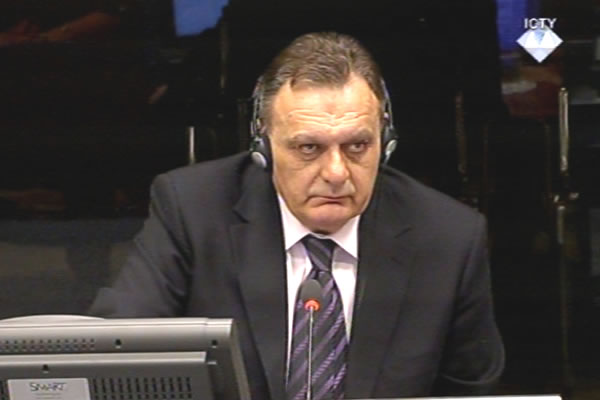Home
‘POLICE SHOULD NOT INTERFERE’
Former deputy police chief in Vlasenica testified today as Karadzic’s defense witness. Mane Djuric claims that he didn’t know about the plans to execute the prisoners captured in Srebrenica in July 1995. The witness said that the deputy interior minister told him the police should ‘secure the routes for the transportation of the detainees and not interfere’
 Mane Djuric, defence witness of Radovan Karadzic
Mane Djuric, defence witness of Radovan Karadzic Serbs and Muslims in Vlasenica started arming up before the war broke out, but as Mane Djuric, former local police deputy chief, explained, Muslims did it ‘illegally’ through the Democratic Action Party. Serbs, on the other hand, obtained arms legally by responding to the call-ups.
As he answered Karadzic’s questions, the witness denied that there was a prison camp in Vlasenica. The witness claimed that a ‘reception center’ was located in Susica. It was used by civilians from all ethnic groups as they waited for transportation to be organized in order to leave town. In the reports Djuric sent to his superiors he stated that the accommodation, food and security were ‘in accordance with the standards set by the international humanitarian organizations’.
The witness claimed that the inhabitants in many Muslim villages were armed; Zaklopaca was one of the villages that didn’t surrender weapons. The incident schedule in the indictment states that at least 60 civilians were killed there on 16 May 1992. The witness confirmed that he heard about the murder of civilians in the village of Drum in June 1992. The civilians were killed after an action by the Territorial Defense and the army. At the request of one of the villagers, the police organized ‘a dignified burial’ for the nine victims. As alleged in the indictment, as many as 20 men were killed in the village of Drum on or around 2 June 1992.
The prosecutor dedicated most of the cross-examination to the effort to determine what the Vlasenica police knew and the role it played in the Srebrenica massacre in July 1995. The witness ‘couldn’t remember’ why he wrote down Miroslav Deronjic’s phone number in his notebook on 12 July. The witness’s memory failed again when he was asked about the note of 14 July, when the witness wrote down the phone number of the small house across the road from the Grbavci school. More than 1,000 persons were detained in the school that day. They were later executed in a field in Orahovac. The witness also made a note about the contact details for Vujadin Popovic, the Drina Corps security officer. Popovic was sentenced to life for his role in the Srebrenica genocide. The witness also wrote ‘4th Battalion’ in his notebook: soldiers from that unit executed the captives in Orahovac that day but the witness couldn’t remember why he had written the words down.
Djuric said he had not been notified that on 14 July around 1,000 detainees would be transferred from Bratunac to Zvornik, where he was at the time. According to the witness, he learned about them only when he saw a convoy of buses. The witness said he believed that the buses were traveling towards the Batkovici prison camp or to the territory under the BH Army control. At the prosecutor’s insistence, the witness admitted that those men were indeed ‘killed’; he learned about it in ‘the following days’.
The witness contested the claims made by Tomo Kovac in his statement to the OTP investigators: Kovac, a top official in the Republika Srpska MUP, said that in the evening of 13 July he heard from Djuric that the captives would be transferred from Bratunac because there was not enough space. Today Djuric claimed the opposite: he in fact spoke to Kovac on 14 July when the convoy arrived in Zvornik. According to Djuric, Kovac told him that the police should ‘secure the routes and not interfere’. The witness remained adamant that he didn’t know what had happened to the detainees although the prosecutor told him that civilian police officers were in each bus.
Linked Reports
- Case : Karadzic
- 2013-03-06 NOBODY EXPELLED MUSLIMS AND THEY SHELLED THEMSELVES
- 2013-03-05 WITNESS HEARD A LOT, KNEW LITTLE
- 2013-03-04 NEUTRAL BUT ON SERB SIDE
- 2013-03-11 VERIFYING ‘RUMORS’ ABOUT CONDITIONS IN PRISON CAMPS
- 2013-03-12 WHAT KARADZIC’S WITNESSES DIDN’T SEE
- 2013-03-13 HOUSEWIVES KNEW MORE THAN MUNICIPAL DEFENSE SECRETARY
